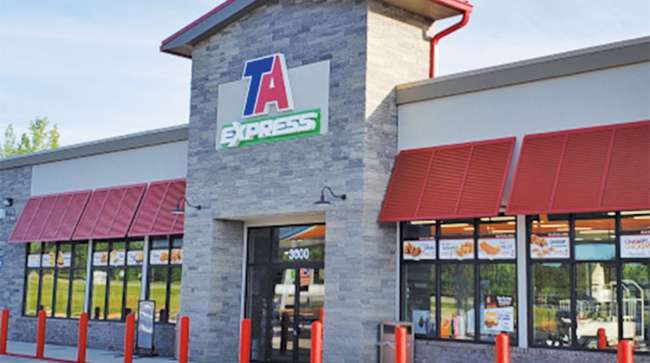Senior Reporter
No Diesel Shortages at TA, CEO Jonathan Pertchik Says

[Stay on top of transportation news: Get TTNews in your inbox.]
TravelCenters of America CEO Jonathan Pertchik said the company has not experienced a shortage of diesel of late amid tight supplies, calling it a less impactful situation compared with fuel rationing spawned by a huge Texas ice storm, shutdowns at Ohio refineries and a hack that halted flows in the 5,500-mile-long Colonial Pipeline — all occurring in 2021.
As a result of those “very much worse” earlier events, Pertchik said, “we had to ration diesel, and not just us, the industry. We went dry for a short period in a few places.”
That was then.

Pertchik
“We’ve had none of that this go-round,” he said. “So the media grabbed it [likely fuel shortages in the Northeast especially] and gave it a lot of attention. We continue to manage the supply we can get very well. It’s not nearly as big a thing, I think, as it was made out to be starting a month or so ago.”
TA is a full-service travel center network with 276 locations in 44 states, principally under the TA, Petro Stopping Centers and TA Express brands. It offers diesel and gasoline fuel, truck maintenance and repair, full-service and quick-service restaurants, travel stores, car and truck parking and other services.
Pertchik has his sights set on increasing the number of locations.
“We are investing very significantly in acquisitions. We have closed on roughly $52 million worth of acquisition. We have a pipeline of another $130 million to $150 million and we are really excited about the cash-on-cash returns of these,” said Pertchik, who has been CEO since 2019.
“We want to cherry-pick the locations and corridors we want to be in, and those we will buy or potentially develop,” he said.
At the same time, when an independent truck stop becomes part of its franchise network, big fleets now stop there, he said, unlike before when it was independent and they didn’t because there was no discounting. When such a site joins TA, “we see a 40% uplift in revenue. That’s amazing.”
TA has done a great job of serving its large-fleet diesel customers, but that is a segment where it makes its lowest margin, he said, and TA now is paying more attention to smaller operators and solo truckers.
“Only 10% of our volumes are other than large fleets. They just drive up and pay at the pump. That’s typically a solo trucker and a small fleet, with 1 to 99 trucks, and that segment contributes north of 40% of the whole dollar margin.”
TA is at the beginning of a small-fleet program, he said, that includes discounts, loyalty points and “we can extend credit on a bank balance sheet. It’s a very robust program. We are outperforming my expectation.”
If a persistent softening of freight demand develops, TA will be buoyed by its new small-fleet program and the expected high margins on diesel, he said.
To serve others who just drive up for ”street diesel,” its highest margin, lowest volume sales, he said, TA is analyzing how to find more available gallons and price them in a more sophisticated manner using AI and machine learning.
Want more news? Listen to today's daily briefing above or go here for more info
Pertchik said TA was also investing in its truck service business, including retaining talent and acquiring more trucks for mobile service, the fastest growing part of that business. “We are investing $13.3 million this year in additional trucks just to support that growth.”
TA’s first-quarter net income for the period, ended March 31, climbed to $16.3 million, or $1.10 per diluted share, compared with a net loss of $5.7 million, a 40-cent loss, a year earlier.
First-quarter revenue reached $2.3 billion compared with $1.5 billion a year earlier. Fuel revenue accounted for $1.8 billion compared with $1 billion a year earlier. Nonfuel revenue was $487 million compared with $448 million in the 2021 period.


